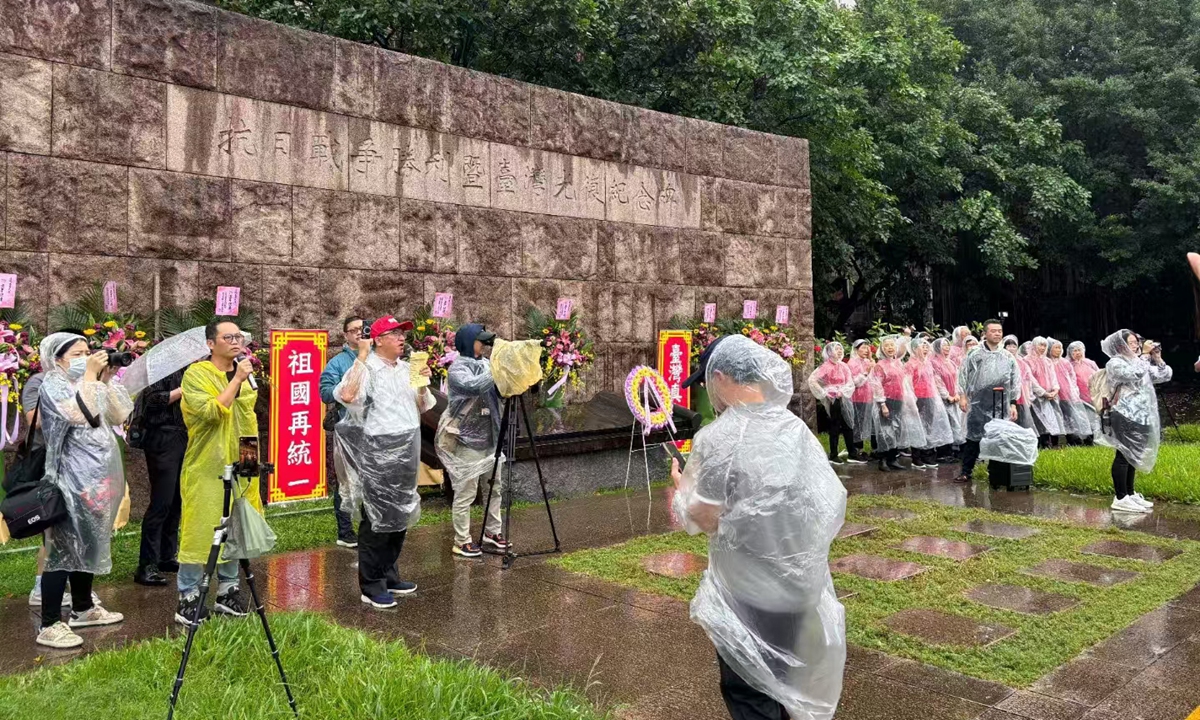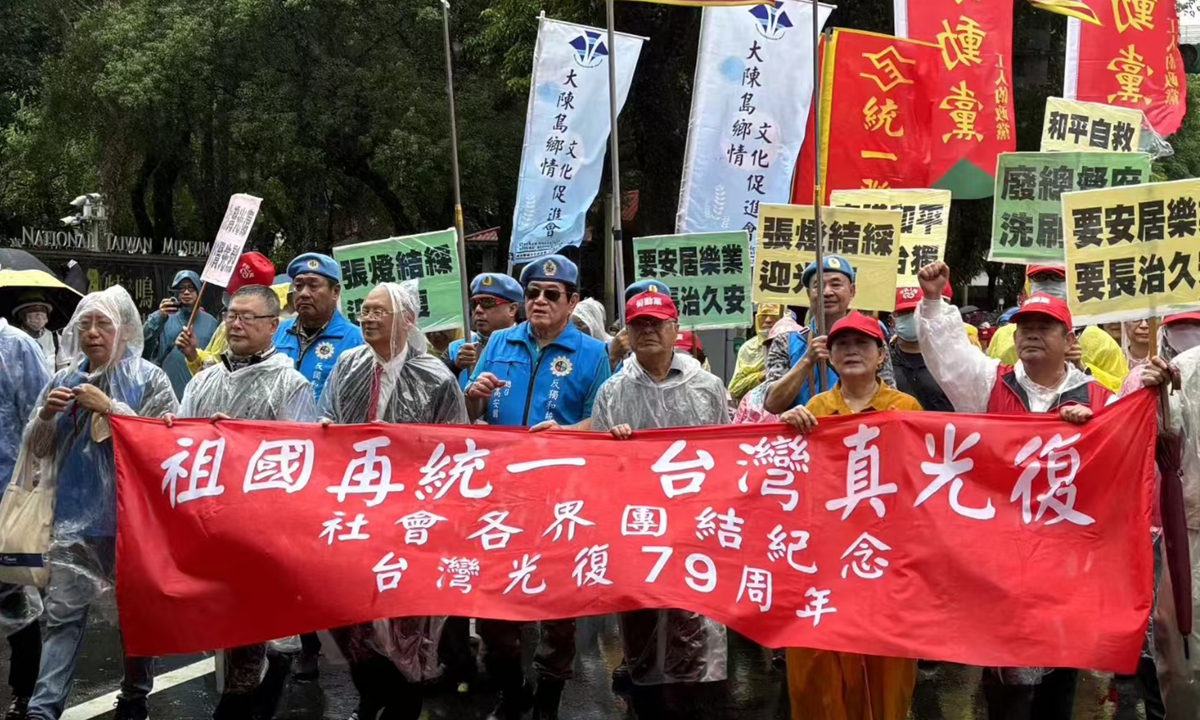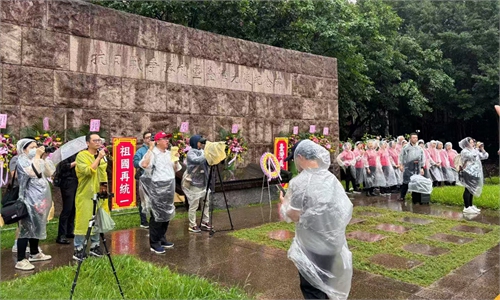
Political parties and social groups in Taiwan gatherin Taipei to commemorate the 79th anniversary of China's recovery of sovereignty over Taiwan from Japanese occupation on October 25, 2024. Photo: Courtesy of Taiwan's Labor Party
A Chinese mainland spokesperson on Friday rebuked Taiwan's Democratic Progressive Party (DPP) authorities, led by Lai Ching-te, for downplaying and denying the historical significance of Taiwan's return to China from Japanese occupation in 1945.
On the same day, some political parties and social groups in Taiwan gathered in Taipei to commemorate the 79th anniversary of China's recovery of sovereignty over Taiwan from Japanese occupation, expressing their great respect for the Chinese martyrs who fought against Japanese aggression and colonial rule, and strong dissatisfaction with the DPP authorities for distorting history and promoting the secessionist line.
Analysts from both the Chinese mainland and Taiwan island said that in the context of the DPP's attempts to whitewash Japanese colonial rule, preach the "undetermined status of Taiwan" and erase the Chinese national identity of the Taiwan people, the commemoration is of great significance.
Taiwan's return to the motherland is the fruit of the victory won by all sons and daughters of the Chinse nations, including our Taiwan compatriots, in the joint struggle against aggression, which highlighted the historical and legal fact that Taiwan is an inalienable part of China's territory, and that deserves to be commemorated and celebrated by compatriots on both sides of the Taiwan Straits, said the State Council's Taiwan Affairs Office spokesperson Zhu Fenglian on Friday.
She said it is hoped that the majority of Taiwan compatriots will remember the history of Taiwan's martyrs' resistance to the Japanese invasion, deeply understand the great significance of Taiwan's recovery from Japanese occupation, recognize the nature and dangers of the DPP's "Taiwan independence" secessionism, and work together with mainland compatriots to promote the process of reunification of the motherland.
On Friday, about 1,000 Taiwan people from more than 15 pro-reunification groups gathered in front of Zhongshan Hall, where Japan surrendered more than seven decades ago in Taipei, commemorating the island's recovery from Japanese occupation, according to local media reports.
Despite the rain on the day, the enthusiasm of the pro-reunification groups on Taiwan remained unabated. According to Taiwan-based media, groups and parties' members participating in the activity laid flowers in front of the monument marking Taiwan's recovery from Japanese occupation and paid tribute to martyrs on Friday morning. Pulling up banners calling for reunification of the motherland, the crowd then marched to Ketagalan Boulevard in the heart of Taipei, close to the Taiwan leader's office.
In a joint statement sent to the Global Times from Taiwan's Labor Party, pro-reunification groups and parties participating in the activity said that Taiwan's return to China is a glorious achievement of the Chinese people's fight against aggression, and the legal position of 'Two sides of the Taiwan Straits belong to one China' shall not be challenged.
While commemorating Taiwan's recovery from Japanese occupation, they said that it's also necessary to oppose the DPP authorities' collusion with external forces, as it will push Taiwan to the brink of war. They called for Taiwan authorities to open dialogue and consultation with the mainland as soon as possible, so as to ensure long-term stability.
Zhang Wensheng, deputy dean of the Graduate Institute for Taiwan Studies at Xiamen University, told the Global Times that commemorating the history of Taiwan's recovery from Japanese occupation not only implies a common historical outlook and national identity between the two sides of the Straits, but also reminds those who are unclear or unwilling to admit the truth that China's sovereignty over Taiwan should never be challenged.
Taiwan was seized by Japan in 1895 after the Qing government was defeated in a war against Japanese aggression. On October 25, 1945, the Chinese government announced that it was resuming the exercise of sovereignty over Taiwan, and the ceremony accepting Japan's surrender in Taiwan Province of the China war theater of the Allied powers was held in Taipei. From that point forward, China recovered Taiwan de jure and de facto through a host of documents with international legal effect.
However, the DPP authorities have long been attempting to confuse the public by falsifying history, and using "Taiwan's status as undetermined" rhetoric, Zhang said, "It has deliberately confused the concept of sovereignty with that of a historical regime in an attempt to disturb the perception of the island and the international community."
Eric Chu, the chairperson of Taiwan's main opposition party Chinese Kuomintang (KMT), on Friday called on Taiwan regional leader Lai Ching-te to join the people's commemoration of this significant event marking the end of colonial rule under Japanese invaders.

Political parties and social groups in Taiwan gatherin Taipei to commemorate the 79th anniversary of China's recovery of sovereignty over Taiwan from Japanese occupation on October 25, 2024. Photo: Courtesy of a Taiwan pro-reunification group
'Serious blasphemy'
The DPP authorities did not hold any commemorative events to mark the historical moment, while its secessionist leader Lai paid a visit to Kinmen islands and commemorated the 75th anniversary of the Battle of Guningtou, which took place in late October, 1949 between the Chinese People's Liberation Army and Chiang Kai-shek-led forces after the latter lost the Chinese civil war and fled to Taiwan island.
Lai told veterans and family members that the Battle of Guningtou in October 1949 represents determination to protect "our country," according to media reports, which analysts viewed as yet another provocative move following his secessionist "Double Ten" speech on October 10.
Lai has made use of the Battle of Guningtou to downplay the historical connection between the two sides of the Taiwan Straits in their common fight against foreign aggression, while hyping up the hostility and confrontation with the mainland, Chang Ya-chung, president of the Sun Yat-sen School in Taiwan and a member of KMT, told the Global Times on Friday.
Those tricks in essence served his goal of cutting the cultural and historical bonds between the mainland and Taiwan island, Chang added.
The State Council's Taiwan Affairs Office Spokesperson Zhu Fenglian on Friday slammed the DPP authorities' stubborn insistence on "Taiwan independence" secession and Lai's new "two states" theory advocating that the two sides of the Straits do not belong to each other.
She said Lai obliterated the achievements of the martyrs, whitewashed Taiwan's colonial past under Dutch and Japanese rules, and attempted to construct a "Taiwan independence view of history", confusing society and poisoning the young generation.
What Lai has done is a blatant denial of the victory in the Chinese People's War of Resistance Against Japanese Aggression and the World Anti-Fascist War, and a serious blasphemy against the great national sacrifices made by compatriots on both sides of the Taiwan Straits, said Zhu.
According to Taiwan media reports, many political parties, including KMT, have called for the annual commemoration of the motherland's recovery of Taiwan from Japanese occupation to be restored as a public holiday.
"Secessionists attempted to distort history so as to eliminate the Taiwan people's national and cultural identity with China," said Zhang, adding that this insidious intention is doomed to fail.

